What is prenatal depression? Symptoms, signs and support
Prenatal depression, or antenatal depression, is far more common than you may think...
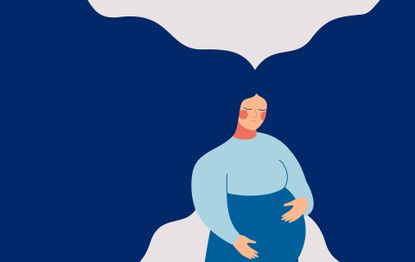

Most of us will have heard of postnatal depression (PND) but what about prenatal depression? Also called antenatal or perinatal depression, this condition may come as a surprise to many.
There is a tendency to regard pregnancy as one of the happiest times in a woman's life, so easily forgetting that every mother goes through matrescence - the process of becoming a mother - and it has a profound impact on who they are as a person. Celebrities and social media fuel this belief further, with filtered photos of glowing pregnant women #livingtheirbestlife. True, pregnancy can be a wonderful, life-changing experience. But it can also be a period of uncertainty, worry, discomfort, and morning sickness. If a pregnant woman finds she's struggling mentally she may have prenatal depression.
"Prenatal depression is a type of clinical depression which occurs during pregnancy," says Dr Joanne Black, Chair of Faculty of Perinatal Psychiatry at the Royal College of Psychiatrists. "It's important that women have an awareness of this. Many don’t know that depression during pregnancy is relatively common, important and treatable," she says.
What is prenatal depression?
Pregnant women may not be aware that there's a specific depression attributed to pregnancy until they're actually suffering from it. But it's not uncommon. This is especially true if you've had depressive episodes in the past. "For many people who experience prenatal depression, studies have found that about half of people have a previous history of depression which re-emerges during pregnancy, although this is not pre-determined," explains Dr Orinayo Onabanjo, Lead Psychologist for pregnancy and postnatal online clinic Naytal.
Some of us may be more prone, but prenatal depression can affect anyone. "For others, this may be the first time they ever experience depression," says Dr Onabanjo. "Regardless of an individual's previous experiences of mental health, it affects about 7-15% of people during the period of pregnancy."
What determines prenatal depression from a few low days is time and severity. "Depression during pregnancy is more severe than 'baby blues' in the sense that it is more persistent in nature," says Dr Onabanjo. "Depression tends to persist for 3-4 weeks and beyond, and significantly impairs the individual's personal and interpersonal functioning," she explains.
There are other reasons why pregnant women may get depressed and lots of campaigns to help women feel less lonely such as the Mum Ribbon Movement. "Surging hormones, anxiety around finances and work commitments, relationship uncertainties, lack of sleep, worry about the birth, and previous experiences of pregnancy and birth can all cause some women to head into prenatal depression," says Baby and Parenting Expert Rachel Fitz-Desorgher. A difficult pregnancy or struggling to conceive in the first place, an unexpected pregnancy or ambivalence about being pregnant, a lack of support, physical illness, and trauma such as a bereavement can also trigger the condition. Being pregnant with twins or triplets can also raise some women's risk of prenatal depression. In one study, a third of women carrying twins reported major depression.
GoodtoKnow Newsletter
Parenting advice, hot topics, best buys and family finance tips delivered straight to your inbox.
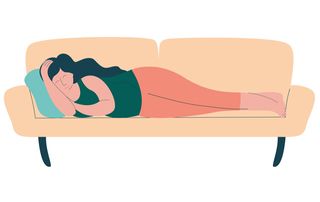
Prenatal depression symptoms
It's not unusual to have some of the following symptoms, on and 0ff, during pregnancy. Hormones can affect mood and make pregnant women weepy and snappy. Carrying a developing foetus can also make sleeping and eating the right foods tricker, and getting out and about more arduous. However, if you're pregnant and regularly experiencing symptoms, it's time to speak to your midwife or doctor.
Common symptoms include:
- Depression
- Anxiety
- Irritability
- Feelings of hopelessness
- Frequent bouts of crying
- Loss of interest in activities
- Withdrawal from socialising
- Excessive tiredness
- Sleep disturbance
- Changes to appetite (eating too much or too little)
- In severe cases, women contemplate suicide. "Suicide is a leading cause of maternal death in pregnancy in the UK," says Rachel Fitz-Desorgher.
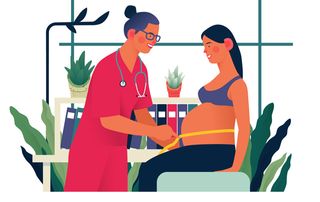
Does depression during pregnancy affect the baby?
To date, studies have proved mixed as to whether perinatal depression (perinatal being the time both before and after birth) has a long-term effect on babies. This is because depression can be triggered for numerous reasons, including lifestyle and environmental factors.
For example, research undertaken by the University of Warwick found that 'mums-to-be living in war zones/areas of armed conflict were at heightened risk of giving birth to underweight babies.' While this could be, in part, due to stress and/or depression in pregnancy, it may also be due to limited or no access to maternal healthcare.
What research has indicated, so far, is that depression in pregnancy may impact the neurobehavioural development of the unborn baby as well as the environment within which the baby grows, says Dr Onabanjo. "Studies also show that maternal mood state can also affect foetal heart rate, sleep patterns and level of foetal activity within the womb," she explains. "This suggests that the baby is impacted by the mental state of their mothers. And existing research has linked prenatal depression to some children needing greater support with their cognitive and emotional development needs in childhood."
While this sounds alarming, Dr Onabanjo is quick to stress that this is by no means the result for every case. "Further research is needed to elucidate the nature of such links," she says. "Moreover, there is no guaranteed negative effects or suggestion that the impact is permanent." Rather than it being a straightforward case of nature or nuture, it's likely to be a combination of both. "It's difficult to know if it's the depression that increases the risk to the baby of lower birth weight, poor growth in infancy and reduced breastfeeding," says Rachel Fitz-Desorgher. "Or if it's the factors leading to, and resulting from, the depression, such as women not keeping antenatal appointments, poor diet and reduced self-care that are to blame."
It may also be reassuring to know that emotional distress – whether through depression or in response to life stressors – is a normal part of being human, says Dr Onabanjo. Sometimes it's impossible to avoid tumultuous times during pregnancy. "This is why we recommend that pregnant women focus on being as healthy as possible and seek help to improve their mental health," she says.
Therefore, it's essential that mums-to-be attend medical appointments and ultrasounds throughout their pregnancy. Unfortunately, due to the isolating nature of perinatal depression, they may avoid going. "Both mental and physical health is really important for both mum and baby, so it's crucial that mums feel able to share their concerns about their poor mental health with their midwife, who will ask about it at every contact," says Dr Black.
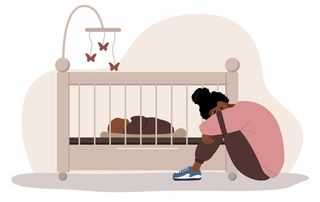
How long does it last?
There is no set answer for how long prenatal depression lasts. Some women will feel depressed for a relatively short period during their pregnancy; others for longer. "For instance, as the exhaustion and sickness of early pregnancy eases, so can some women's depression," says Rachel Fitz-Desorgher. Alternatively, some women may feel it more acutely in their final trimester when tiredness, discomfort, possible conditions such as pre-eclampsia and gestational diabetes, and the baby's imminent arrival may cause anxiety.
You would be forgiven for thinking that perinatal depression ends when sufferers give birth. This isn't always the case. "There is no guarantee that symptoms will go away once the baby is born as it depends on what factors may have contributed to the individual's depression during pregnancy in the first place," explains Dr Onabanjo. "Left untreated prenatal depression can extend well beyond the pregnancy and postnatal period and become more severe than what it was at the onset. Therefore, the most important things that help mitigate this are having a good support network and receiving support as early as possible," she advises.
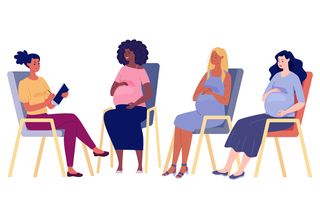
Treatments for prenatal depression
Fortunately, there are treatments available for prenatal depression. However guilty or upset you may feel, please know that you won't shock health professionals – they will have seen cases before and are there for you.
Treatment for prenatal depression is similar to other forms of depression. "This is a combination of talking therapies, including counselling and cognitive behavioural therapy (CBT), self-help strategies and, where appropriate, pregnancy-safe medication," explains Rachel Fitz-Desorgher. You may be referred to online CBT, a counsellor, therapist, psychiatrist, or to a perinatal psychologist who deals specifically with pregnant women and new mums. There are also support groups available.
For women who are experiencing domestic abuse, there are resources available. "If mums-to-be are living with ongoing issues around domestic abuse they can speak with their midwife," says Dr Black. Alternatively, call Refuge on 0808 2000 247 or visit the Women's Aid website.
Your first port of call should be your GP or your midwife. They will decide on appropriate treatment, depending on the severity of your symptoms. "A referral can be made through your GP. However, if you are experiencing more moderate to severe levels of depression you can ask your midwife or obstetrician to refer you to the specialist mental health midwives at your chosen hospital, as well as your local perinatal mental health team, which specialises in supporting mums and their families in the community," explains Dr Onabanjo.
A small number of women who become very poorly with severe depression and invasive or suicidal thoughts will get specific care. Acutely unwell women, says Dr Onabanjo, may need a referral to an MBU (mother and baby unit) where inpatient support by a multidisciplinary team of specialists can support them on their journey to recovery.
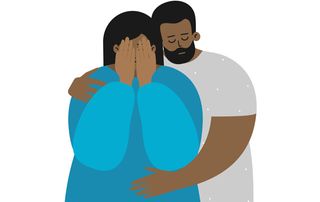
Support for prenatal depression
If you are pregnant and feel depressed, or you know a pregnant woman who is struggling, reach out. While this is easier said than done it is the essential first step. "It can be very difficult for women to admit their feelings due to expectations to be happy about being pregnant. But it's really important that women get help to ensure treatment and support is put in place," says Rachel Fitz-Desorgher. "Once they have spoken to their GP, they can be signposted to support groups and healthcare professionals, and have their recovery monitored," she says.
You can also look at Tommy's and PANDAs Foundation. These excellent charitable organisations provide a wealth of information and resources about prenatal and postnatal depression.
Can you reduce the risk of prenatal depression?
It's impossible to know whether life will throw you a curveball while you're pregnant. Or if you will have an easy or difficult pregnancy. If you already suffer – or have suffered – from depression or another mental illness, you may have to accept that you are more vulnerable to prenatal depression. Look at it this way – forewarned is forearmed.
Dr Black has some sound advice for women with a history of mental health problems or trauma:
- When planning a baby, if you know you are at risk of depression try to plan in advance. If you use antidepressants, please don’t abruptly stop as we know this often leads to a relapse. Your doctor or pharmacist can guide you with regard to the safety of medication in pregnancy.
- If you're in – or waiting for – talking therapy for trauma or previous poor mental health, try to complete this prior to a planned pregnancy. Speak with your midwife about your mental health so she can help or make an onward referral.
- Plan with your partner, friends and family about what support you might need.
Whether you've had previous mental health problems or not, our experts recommend these tips to all pregnant women:
- Seeking help and support early is an important protective factor. Don't suffer in silence. The sooner you access treatment the stronger a position you'll be in.
- Be aware of triggers that may affect your mental health. For example, if a heavy workload has caused burnout in the past, don't muddle through. Prioritise your wellbeing where possible.
- Talk. "Just by acknowledging that all in the pregnancy garden is not rosy, women can begin to relax," says Rachel Fitz-Desorgher. "They start to realise that they are not alone."
- Cultivate self-compassion practices. These can include rest and relaxation, plenty of sleep, pregnancy yoga, massage, mindfulness and meditation. If you use essential oils to relax, be aware that not all oils are safe to use in pregnancy. Neal's Yard offer a range of essentials oils that are safe.
- Exercise. "Daily gentle exercise like walking or swimming has been shown to be great for managing depression of all kinds. Prenatal depression is no different," says Rachel. "Better still, get out for exercise when daylight is at its maximum – even in winter the middle of the day is brighter. This is because daylight on the eyes has a positive effect on the brain chemicals, which are disrupted in depression."
- Avoid stimulants. Smoking, alcohol and caffeine may all have a detrimental effect on mother and baby.
(Rachel Fitz-Desorgher will be speaking at The Baby Show at London's Excel from 4-6 March)

Debra Waters is an experienced online editor and parenting writer. She also has a strong background on health, wellbeing, beauty, and food. She currently writes for Goodto and Woman&Home, and print publications Woman, Woman’s Own, and Woman’s Weekly. Debra has written for What to Expect, Everyday Health, and Time Out. In addition, she has had articles published in The Telegraph and The Big Issue.
-
 Compromising may be killing your relationship - here are 5 ways to reach healthy compromises, according to relationship expert
Compromising may be killing your relationship - here are 5 ways to reach healthy compromises, according to relationship expertCompromising isn't always the best way to keep the peace in a relationship
By Charlie Elizabeth Culverhouse Published
-
 Best interactive pets for kids: 15 gift ideas for children of all ages
Best interactive pets for kids: 15 gift ideas for children of all agesFrom puppies to axolotls, take a look at our selection of the best interactive pets you can buy that are sure to be a hit with little animal lovers
By Sarah Handley Published
-
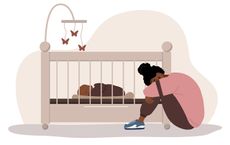 What is postnatal depression and what treatment is available?
What is postnatal depression and what treatment is available?Everything you need to know about spotting whether you have postnatal depression
By Debra Waters Published
-
 Male postnatal depression: Symptoms and signs of depression in dads
Male postnatal depression: Symptoms and signs of depression in dadsCharities are looking to break the huge taboo surrounding support for new fathers
By Debra Waters Published
-
 Placenta encapsulation and eating your placenta - is it safe and what are the benefits?
Placenta encapsulation and eating your placenta - is it safe and what are the benefits?Placenta is a natural part of every woman's pregnancy - but can it benefit you once your baby is here?
By Sibelle Mehmet Published
-
 Postnatal depression and breastfeeding
Postnatal depression and breastfeedingShould you keep breastfeeding with postnatal depression? Will it help with the symptoms or make them worse? Here are some things to consider before deciding
By Beth Ivory Published